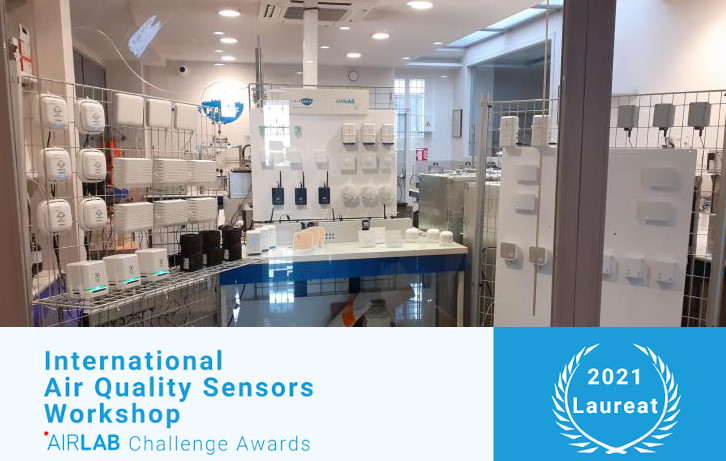
Many air quality experimentation and innovation projects are being developed, based in particular on microsensors. What is the performance of these devices with respect to their usage? How do their performances change over time? AIRPARIF decided to answer these questions in a global challenge that puts the many sensors in a fierce confrontation.
Great day for uRADMonitor today as a double winner at the #Microsensorchallenge2021 !
The results of the 2021 AIRLAB Microsensors Challenge were revealed today, during the International Air Quality Sensors Workshop in Paris.
uRADMonitor AIR won the “Citizen Air Award” and uRADMonitor SMOGGIE, the compact #opensource monitor got the “Outdoor Air Awareness Award” , presented by Karine de FREMONT, Director of the Urban Transition and Mobility Department AFD – Agence Française de Développement.

uRADMonitor SMOGGIE is now at its 5th version, incorporating many improvements and using the best technology on the market, while remaining very cost effective to encourage mass adoption, DIY constructions and experimentation in schools and universities, all these converging to an increased sensor presence on the field. That’s more environmental data for all of us and awareness.
The conference included speeches from Vicente Franco, Policy Officer – European Commission ; Dr. Oksana Tarasova, Chief of the Atmospheric Environment Research Division – WMO. ; Olivier Ramalho, Multiexposure project leader – CSTB & OQAI ; Hélène Devillers, Director – ATMO HDF ; Vincent Dupuis, Lecturer – Université Pierre et Marie Curie & DIM QI2 ; Nuria Castell, Senior Scientist – NILU ; Dr. Rachelle Duvall, Environmental Engineer – U.S. EPA ; Dr. Andrea Polidori, Advanced Monitoring Technologies Manager – AQSPEC ; Dr. Christoph Hüglin, leader of the ambient air quality group – EMPA ; Etienne De Vanssay, President – FIMEA, and many others.
Mr. Vicente Franco, clearly indicated the positive evolution of the Microsensors that will ultimately lead to including their data-streams to the official air quality databases to increase the available data sources:

About the 2021 AIRLAB Microsensors Challenge

The 2021 AIRLAB Microsensors Challenge is organized by Airparif, with the support of : Atmo France, the Swiss Federal Laboratories for Materials Science and Technology (EMPA), FIMEA, the Observatoire de la Qualité de l’air Intérieur, the Lab’Aireka, Incub’Air, the Centre Scientifique et Technique du Bâtiment, the EU Interreg project TransfAIR, and the World Meteorological Organization. It is co-financed by Airparif, the Agence Française du Développement (AFD), the Agence de la transition écologique (ADEME), EDF, DIM QI2 (the Parisian Region Network for Air Quality Research), Atmo Hauts-de-France, Atmo Normandie, Atmo Grand Est, Atmo Sud, Atmo Auvergne-Rhône-Alpes and Qualitair Corse.
The Challenge Jury selected 33 companies for evaluating their proposed solutions. In the comming months, Airparif’s metrology laboratory and Atmo Hauts-de-France will assess 55 solutions using more than 20 metrics.
Accuracy, utility, usability, portability and cost are as many criteria that Airparif and its partners propose to evaluate as part of this Airlab Challenge. In order to transparently inform users about the products adequacy to their intended uses, the microsensors can compete in 8 categories responding to uses such as outdoor air quality, indoor air quality, individual mobility, indicative measurements (the list of categories available bellow).
The outcome of this independent evaluation will be published in the fall of 2021 and will allow visibility of the performance of microsensors currently on the market depending on their uses. This challenge seeks to put highlight the qualities of these devices and the paths for improvement, to promote innovation and technological breakthroughs, to contribute in the development of an emerging market. From autumn, the most relevant sensor solutions will be included in Airlab projects in the fields of connected buildings and citizen participation.

All the results per sensor are freely available on the AIRLAB website via a newly created interactive platform. It offers a navigation among the results of the Challenge, allowing searches by criteria and comparisons between the different solutions. These evaluations are available in French and in English. A new edition of the Challenge is planned for 2023.
The next steps
We are grateful and will use these results to boost our products to even higher performance, remaining committed to building world’s biggest environemntal monitoring network – to increase awareness and responsability in the fight against pollution.
codemore code
~~~~